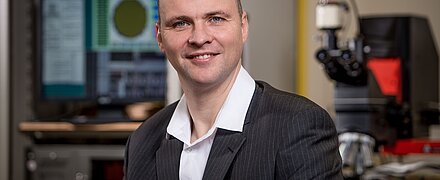Friedel Gerfers investigates how exponentially growing data volumes in the age of the mobile Internet and the integration of networked machines and sensors can be transmitted with maximum energy efficiency and minimum delay times. "To take internationally a leading role in research and development, we particularly require the latest state-of-the-art measuring equipment with signal bandwidths of 100 gigahertz or more to complement interdisciplinary expertise in the the areas of communications technology, signal processing, circuit technology, semiconductor devices, and silicon-based technologies. The funding provided by the Einstein Foundation Berlin enables the establishment of an extremely cost and staff-intensive high-frequency laboratory at TU Berlin," Professor Gerfers says.
Friedel Gerfers works at the intersection between antenna and the digital chip interface, in other words digital signal processing. In the future, he will not only be able to simulate the developed chips but also analyze their actual performance. "The development of this test laboratory is of enormous importance as it makes it possible to examine the entire development process of our chips - from the initial idea, their planned implementation and subsequent manufacture, through to their final characterization. He and his 20 person strong scientific research team are performing research in the field of innovative circuit and system architectures at the intersection of antenna and digital signal processing.This makes it possible to both meet the bandwidth requirements arising from the exponential increase in Internet use while at the same time increase the energy efficiency of these systems.
"The digital correction of the temporal offset in MIMO communication systems of the incident waves are at its limits in terms of energy consumption. This is why we are balancing this in an analog fashion. A patent procedure is currently underway for this technology under the joint leadership of my chair - the Chair of Mixed Signal Circuit Design - and the Heinrich Hertz Institute with whom we work very closely," explains Professor Gerfers, who holds 15 patents and who worked in Silicon Valley in the semiconductor industry from 2006 until 2014 before taking up his professorship at TU Berlin in 2015.



